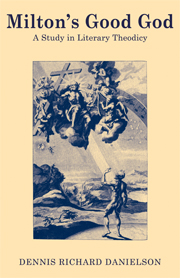Book contents
- Frontmatter
- Contents
- Preface
- 1 The contexts of Milton's theodicy
- 2 God and Chaos
- 3 Assertion and justification: providence and theodicy
- 4 Milton and the Free Will Defense
- 5 Theodicy, free will, and determinism
- 6 Eden and the “soul-making” theodicy
- 7 Paradise Lost and the Unfortunate Fall
- Epilogue
- Appendix: The unfortunate fall of Satan
- Notes
- Selected bibliography
- Index
- Frontmatter
- Contents
- Preface
- 1 The contexts of Milton's theodicy
- 2 God and Chaos
- 3 Assertion and justification: providence and theodicy
- 4 Milton and the Free Will Defense
- 5 Theodicy, free will, and determinism
- 6 Eden and the “soul-making” theodicy
- 7 Paradise Lost and the Unfortunate Fall
- Epilogue
- Appendix: The unfortunate fall of Satan
- Notes
- Selected bibliography
- Index
Summary
It has become almost a cliche that Milton sets out to justify the ways of God to men. Yet especially in an age in which belief in God is unfashionable (unless one finds oneself running for public office or facing sudden death), the whole notion of justifying God can appear dusty and academic, or simply banal – this in spite of the genuine triviality of so much of life in our Western society.
In the face of these discouragements, however, and mindful too of the meager number to which this book will probably speak (perhaps one–thousandth of 1 percent as many as have watched television's most popular soap opera), I have attempted here to make a case for reconsidering the importance for literature of the problem of evil, the importance of Milton's literary contribution to theodicy, even the importance of the whole issue of evil and of a possible human reconciliation of it with the existence of an omnipotent good God. I have tried, furthermore, to put my case critically but in a way that does not ignore the motivations, assumptions, and commitments without which Milton would not have written Paradise Lost, without which I would not have written this book, and without which you would probably not be reading Milton or this book.
- Type
- Chapter
- Information
- Milton's Good GodA Study in Literary Theodicy, pp. 228 - 229Publisher: Cambridge University PressPrint publication year: 1982

